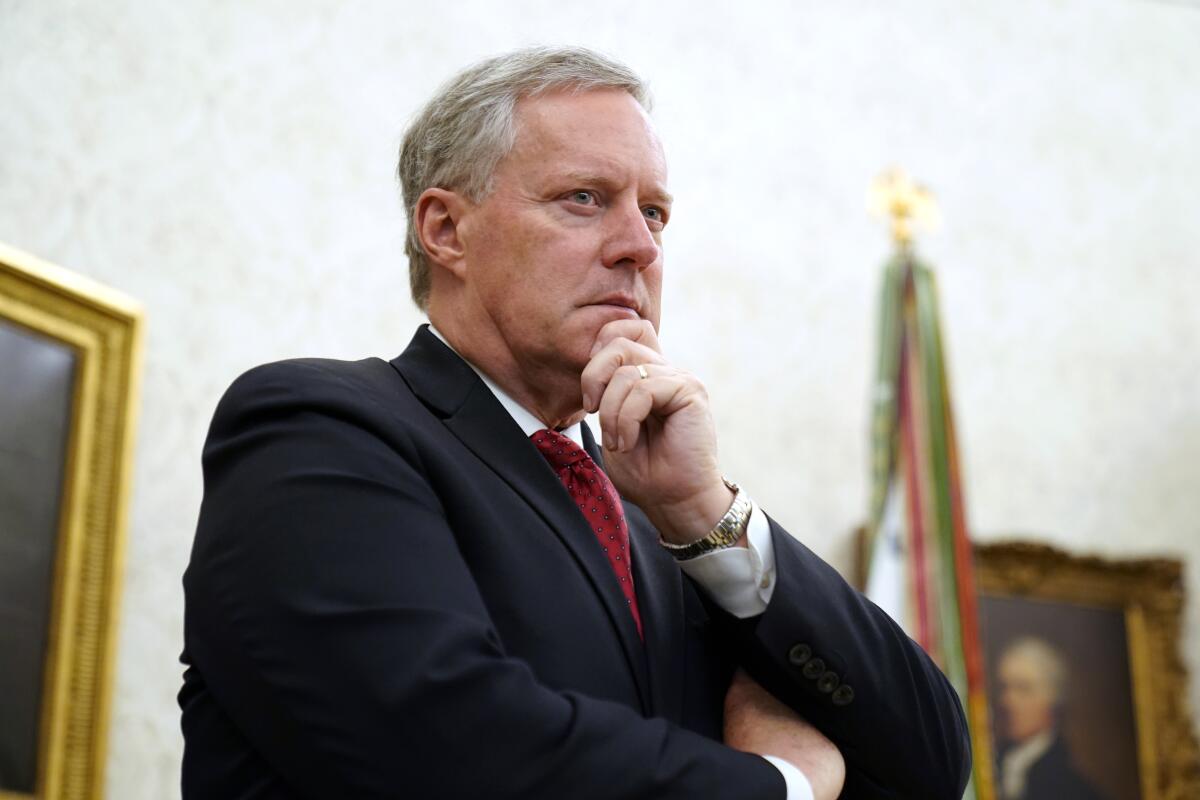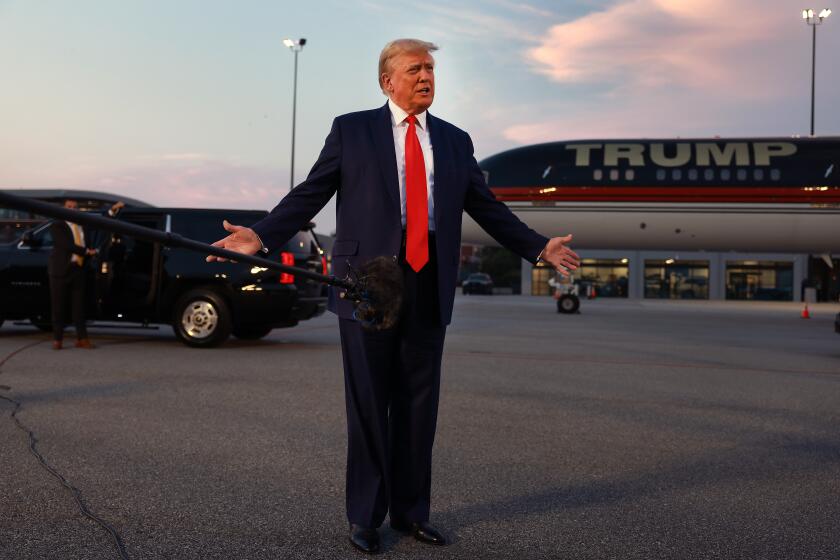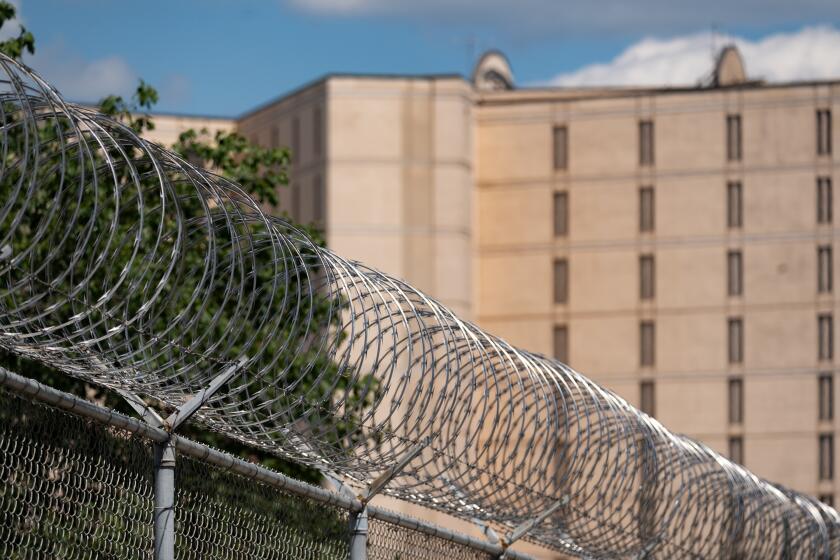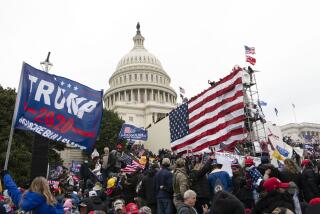Column: Trumpâs Chief of Staff Mark Meadows seems to think he can avoid prosecution. Hereâs how

Former Trump Chief of Staff Mark Meadows was determinedly bland during his surprise appearance on the witness stand this week, which he took in support of a motion to remove the Georgia racketeering charges against him to federal court. Meadows described the conduct charged in the indictment in anodyne terms as, for example, setting up meetings and coordinating phone calls â including then-President Trumpâs notorious Jan. 2, 2021, conversation with Georgia Secretary of State Brad Raffensperger.
But Meadows was forced to depart from that script and his genial manner at a few critical junctures that revealed the longer game he is playing.
Prosecutor Anna Cross pressed Meadows to identify the federal interest or policy advanced by his actions. Meadows tried to keep it dull, preferring safe responses such as âmanagement of the presidentâs time.â But when Cross asked him to identify the federal purpose of taking part in meetings and calls challenging the election results, Meadows replied that it was âto ensure that there were free and fair elections in the U.S.â
Huh?
Prosecutors could have a field day with such a ridiculous response at trial. It defies credulity to claim that Meadows was inspired by a boy scoutâs sense of election integrity to assist Trumpâs effort to undo Bidenâs wins in Georgia and other states.
But Meadows had to resort to this far-fetched response because his real goal is not so much removal to federal court as immunity from prosecution. Thatâs the only way to make sense of the enormous risks Meadows took by testifying, which most commentators (including me) predicted he would not do.
The former presidentâs lawyers tried to employ a political strategy in the Jan. 6 case. But U.S. District Judge Tanya Chutkan isnât having it.
Removal would simply transfer the state charges to federal court. The cameraâfree environment of federal court and a slightly more favorable jury pool â the advantages widely cited in trying to explain Meadowsâ decision to testify â would do little to protect him from Fulton County Dist. Atty. Fani Willisâ charges.
Removal, however, is only the first part of Meadowsâ two-part strategy. The second, climactic move is likely to be a bid for immunity under the Supremacy Clause, which identifies the U.S. Constitution and federal laws as âthe supreme law of the land.â The argument is that no matter how offensive Meadowsâ conduct might have been to the state, the supremacy of federal law prevents charging him with a Georgia crime. We can be sure Meadows will bring the motion with alacrity if his case is moved to federal court, and if he succeeds, it will make the whole case against him go away.
While such a motion could be brought in state court, a sophisticated litigator is likely to prefer to bring it in a more federal-friendly U.S. court.
Hereâs the rub for Meadows. To obtain immunity, he would need to show that his conduct served some actual U.S. government purpose that the Supremacy Clause would forbid the state from annulling. Itâs not enough for Meadows to argue that he was chaperoning a rogue president; he has to demonstrate a legitimate federal goal.
Meadows and his lawyers, who are as capable as any in the whole Trump litigation circus, no doubt thought this through carefully. A different answer to the prosecutorâs question might have helped Meadowsâ removal prospects and held up better in later proceedings, but they have their eyes on the prize of immunity.
That also may explain why Meadows hasnât cut a cooperation deal with federal special counsel Jack Smith, as far as we can tell. Heâs playing for the jackpot of walking free. If he loses on immunity â as he should â he can try to cut a deal with Smith (and Willis) instead.
The former president reported to the Fulton County Jail in Atlanta for booking on charges related to his attempt to overturn the 2020 election result in Georgia.
The immunity play could also account for Meadowsâ flat denial of the indictmentâs allegation that he ordered up a memo to Vice President Mike Pence on how to delay election certification. Denying the charge without knowing the stateâs evidence for it puts Meadows in a precarious position if Willis has the goods. But because thereâs no plausible federal purpose for such a memo, he had to beat back the charge to keep his immunity prospects alive.
Meadows will nevertheless be stuck with these dubious claims in future proceedings, both state and federal, and will need to craft his future testimony around them. Thatâs one of the chief downsides of his taking the stand Monday.
To date, Meadows has been the quietest and arguably the most successful of the constellation of accused criminals around Trump. He dodged a bullet when the Department of Justice declined to bring the contempt charges that the House Jan. 6 committee recommended for his refusal to cooperate. He apparently dodged another one through his limited cooperation with Smith in the federal Jan. 6 case, giving testimony where he had no choice but stopping shy of cutting a deal; the six co-conspirators in the federal indictment donât appear to include him.
We have to hope, though, that Meadowsâ luck has run out. A wealth of evidence suggests he was integral to the scheme to overturn the election, starting with the damning revelations of the committee; remember his aide Cassidy Hutchinson recounting his warning that, âthings might get real, real badâ? As much as anyone except Trump, Meadows deserves to be held accountable in a court of law.
Harry Litman is the host of the âTalking Fedsâ podcast. @harrylitman
More to Read
A cure for the common opinion
Get thought-provoking perspectives with our weekly newsletter.
You may occasionally receive promotional content from the Los Angeles Times.













